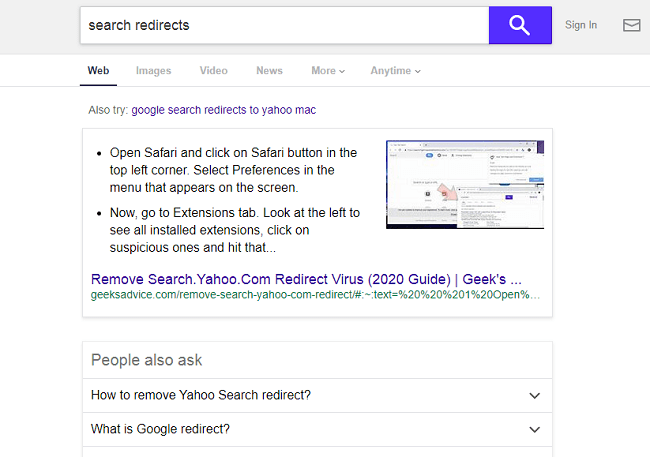What Is Connected Protocol?

Connected Protocol is a browser extension for Google Chrome that can end up on a Mac after a user installs a free or cracked app or launches a file downloaded from an untrustworthy source. Connected Protocol sets Chrome’s default search provider to a fake search engine which redirects users’ searches to Yahoo. Extensions that alter search engine, homepage and similar browser settings against users’ wishes are called browser hijackers. They stop users from changing browser settings that were affected, until the hijackers themselves are deleted. You my follow this step-by-step guide to remove Connected Protocol extension from your Mac and restore your favorite search engine.
How to Remove Connected Protocol:
- Remove ConnectedProtocol Automatically
- Delete Rogue Applications
- Remove Rogue Profiles from Macbook
- Remove Connected Protocol From Browsers
- How to Protect Your PC From Connected Protocol and Other Browser Hijackers
Remove Connected Protocol Automatically
You may try to remove the browser hijacker automatically or use the manual instructions provided below.
However it is still recommended that you scan your system with a good antivirus or anti-malware tool, to find and remove other possible malware and PUPs (potentially unwanted programs) that may have been installed along with Connected Protocol.
Norton is a powerful antivirus that protects you against malware, spyware, ransomware and other types of Internet threats. Norton is available for Windows, macOS, iOS and Android devices.
Some alternatives:
Spyhunter (macOS and Windows)
Delete Rogue Applications:
Go to Applications folder and delete new and suspicious apps.
- On the top menu select Go => Applications.
- Drag an unwanted application to the Trash bin.
- Right-click on the Trash and select Empty Trash.
Remove Rogue Profiles from Macbook:
- Open System Preferences.
- Click on Profiles.
- Click the minus button below to delete rogue settings.
Remove ConnectedProtocol from browsers:
Remove ConnectedProtocol and other new and unfamiliar extensions, then change browsers’ homepage, new tab page, start page and default search engine.
Remove ConnectedProtocol from Safari:
- On the top menu select Safari => Preferences (or Settings).
- Select Extensions tab.
- Select an extension you want to delete and click Uninstall button under the extension’s description.
- Go to General tab.
- Select what you want Safari to open at start-up, on new windows, new tabs and homepage.
- Go to Search tab.
- Select the search engine you want.
Remove Connected Protocol from Google Chrome:
- Click on three dots menu button
 .
. - Select More tools => Extensions.
- Find an extension you want to delete and click REMOVE under it.
- Click Remove in the dialog box.
- Right-click the address bar and select Manage search engines and site search.
- Click on three dots button
 next to the search provider you want and select Make default.
next to the search provider you want and select Make default. - Click on three dots button
 next to hijacker search engine and select Delete.
next to hijacker search engine and select Delete. - On the left sidebar select On startup.
- Under On startup section select Open the New Tab page.
- On the left sidebar select Appearance.
- If Show home button setting is turned on, clear the textfield of the existing address. Put the one you want or select New Tab page.
- Close Settings tab.
ConnectedProtocol Removal from Mozilla Firefox:
- Click on menu button
 and select Add-ons.
and select Add-ons. - Go to the Extensions tab.
- To uninstall an add-on, click on three dots button next to it and select Remove.
- Click on the search icon in the search bar and click Change Search Settings.
- Under Default Search Engine section select search engine you want from the drop-down menu.
- Highlight the hijacker search engine in the table below (the One-Click Search Engines section) and click Remove.
- Go to the Home tab.
- Select what you want the browser to open at homepage, new windows and new tabs.
How to Protect Your Mac From ConnectedProtocol and Other Browser Hijackers:
- Get a powerful anti-malware software, capable of detecting and eliminating PUPs. Having several on-demand scanners would be a good idea too.
- Keep your OS, browsers and security software up to date. Malware creators find new browser and OS vulnerabilities to exploit all the time. Software writers, in turn, release patches and updates to get rid of the known vulnerabilities and lesser the chance of malware penetration. Antivirus program’s signature databases get updated every day and even more often to include new virus signatures.
- Download and use uBlock Origin, Adblock, Adblock Plus or one of the similar trustworthy extensions for blocking third-party advertisements on web-sites.
- Don’t download software from unverified web-sites. You can easily download a trojan (malware that pretends to be a useful application); or some unwanted programs could get installed along with the app.
- When installing freeware or shareware, be sensible and don’t rush through the process. Choose Custom or Advanced installation mode, look for checkboxes that ask for your permission to install third-party apps and uncheck them, read End User License Agreement to make sure nothing else is going to get installed. You can make exceptions for the apps you know and trust, of course. If declining from installing unwanted programs is not possible, we advise you to cancel the installation completely.